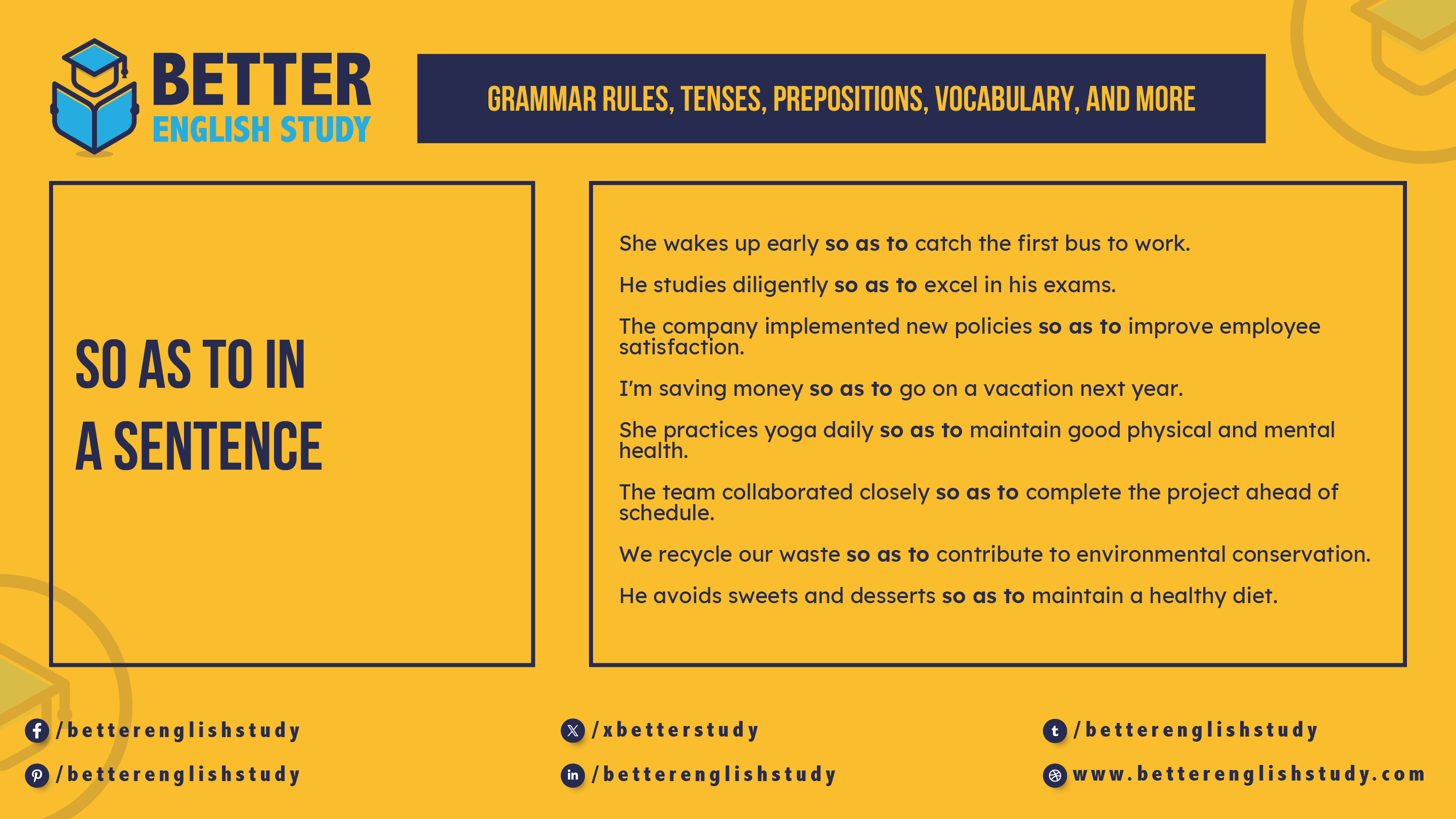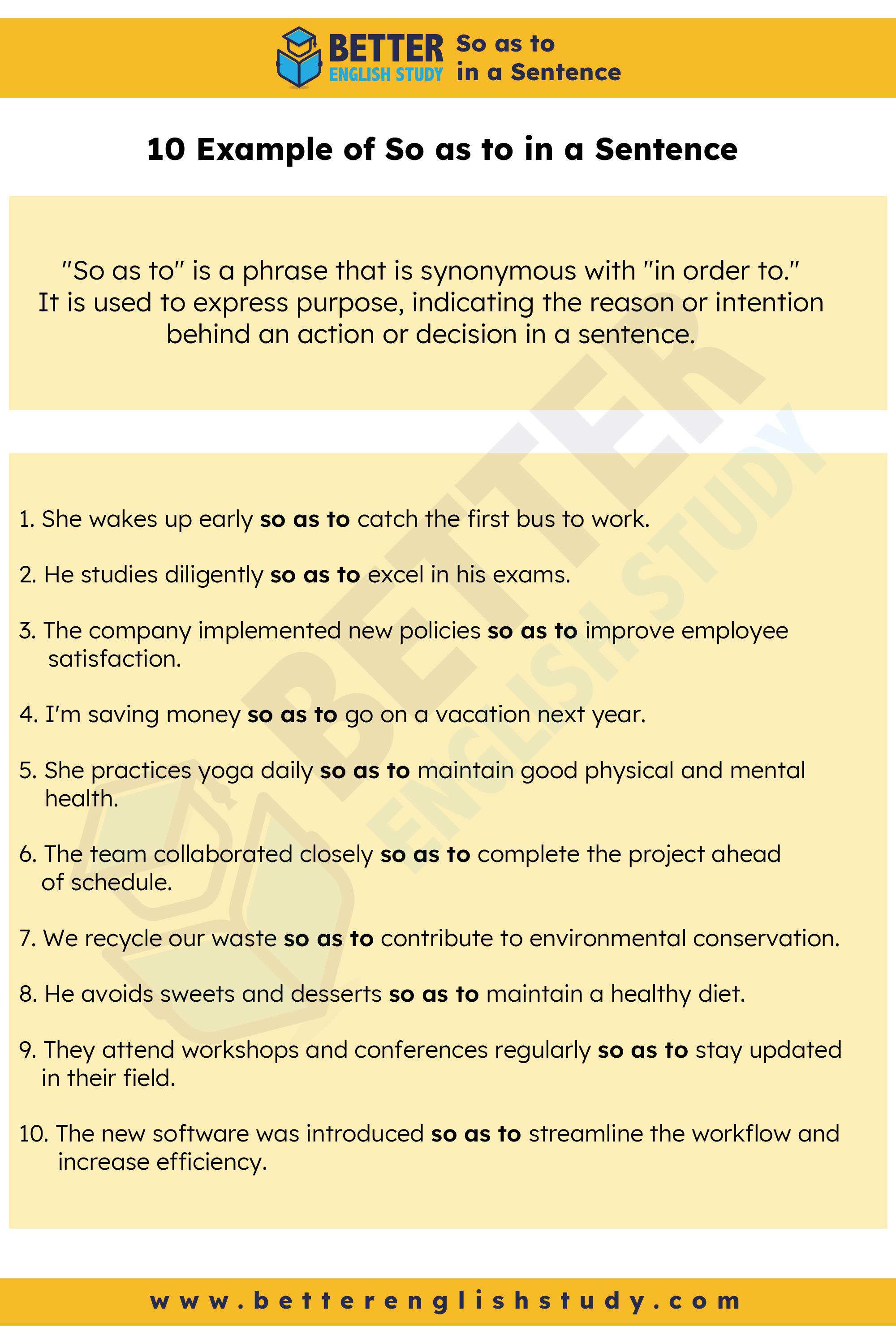
The English language is a tapestry of expressions, and understanding the nuances of various phrases can enhance the clarity and precision of your communication. “So as to” is a phrase that serves a specific purpose in conveying intention or purpose within a sentence.
In this article, we will delve into the meaning of “so as to,” explore when to use it and provide examples to illustrate its usage effectively.
So as to Meaning
“So as to” is a phrase that is synonymous with “in order to.” It is used to express purpose, indicating the reason or intention behind an action or decision in a sentence.
- She wakes up early so as to catch the first bus to work.
Here, the use of “so as to” emphasizes the purpose behind waking up early – to catch the first bus for the daily commute.
- He studies diligently so as to excel in his exams.
The phrase underscores the intention behind the diligent study – aiming to excel in upcoming exams.
- The company implemented new policies so as to improve employee satisfaction.
In this instance, the focus is on the purpose of implementing new policies – with the goal of enhancing employee satisfaction.
- I’m saving money so as to go on a vacation next year.
The intention to save money is clearly communicated, emphasizing the purpose of funding a vacation in the future.
- She practices yoga daily so as to maintain good physical and mental health.
“So as to” articulates the purpose of daily yoga practice – the maintenance of both physical and mental well-being.
When to Use So as to
“So as to” is employed when you want to convey the purpose or intention behind an action. It is a subordinating conjunction that introduces a subordinate clause expressing the reason for the main action in the sentence.
Examples of So as to in a Sentence
- She wakes up early so as to catch the first bus to work.
- He studies diligently so as to excel in his exams.
- The company implemented new policies so as to improve employee satisfaction.
- I’m saving money so as to go on a vacation next year.
- She practices yoga daily so as to maintain good physical and mental health.
- The team collaborated closely so as to complete the project ahead of schedule.
- We recycle our waste so as to contribute to environmental conservation.
- He avoids sweets and desserts so as to maintain a healthy diet.
- They attend workshops and conferences regularly so as to stay updated in their field.
- The new software was introduced so as to streamline the workflow and increase efficiency.

Is It Correct to Say So as to?
Yes, “so as to” is a grammatically correct phrase. It is a formal and slightly more elaborate way of expressing purpose or intention. Let’s look at a couple of examples:
- He arrived early so as to secure a good seat at the seminar.
- She dressed professionally so as to make a positive impression in the job interview.
What is the Difference Between “To” and “So as to”?
The main difference lies in the emphasis on purpose or intention. “So as to” is more explicit in expressing the reason behind an action, providing additional clarity compared to a simple “to.” Let’s compare:
- He studies daily to improve his grades.
- He studies daily so as to improve his grades.
In the second example, “so as to” explicitly communicates that the purpose of studying is to enhance grades.
What Can I Say Instead of So as to?
If you want to vary your language, you can use “in order to” or “to” as alternatives to “so as to.” Here are examples:
- She practices meditation daily in order to reduce stress.
- He works out regularly to stay fit and healthy.
In the realm of language, nuances matter. “So as to” stands as a testament to the richness of expression, providing a nuanced way to articulate purpose. Whether you choose “so as to,” “in order to,” or simply “to,” understanding the subtleties empowers you to communicate with finesse and clarity.
